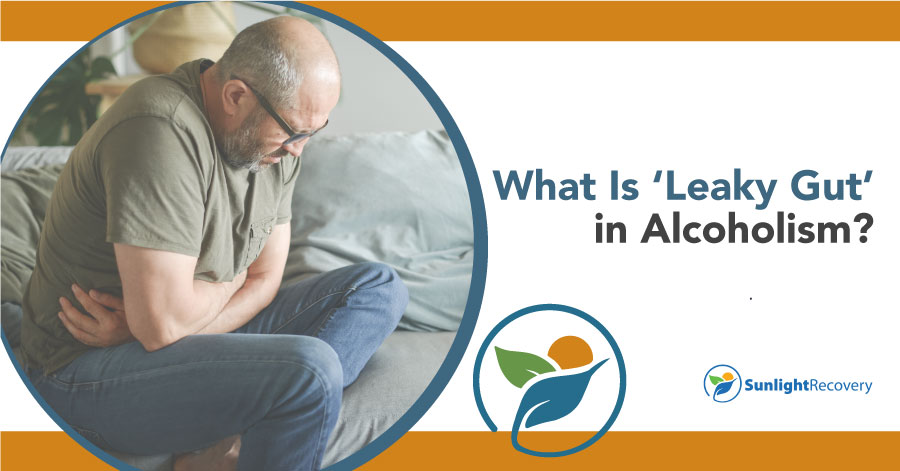The term “leaky gut” has recently gained a lot of online attention. However, don’t be shocked if your doctor is unfamiliar with it. Increased permeability of the stomach lining, or leaky gut, is a relatively recent concept, and there’s an increasing interest in developing drugs to fight the problem.
Before the medical community understood the mechanism of disease, doctors believed certain ailments were caused by stomach imbalances. Hypochondriasis was the name given to this condition in Ancient Greece.
As science progressed, this view changed. We can now observe germs, parasites and viruses under a microscope. For a long time, physicians used “hypochondriac” to indicate someone with persistent and unjustified fear of falling ill, and it may be some time before doctors officially recognize leaky gut as a real condition. But it’s still good to know about it, what causes it and how to treat it.
Alcohol and leaky gut symptoms often go hand in hand. Stopping drinking might be the most effective way to treat leaky gut.
The Relationship Between Alcohol and Leaky Gut
Alcohol consumption impairs normal intestinal function. For starters, alcohol impairs the function of prostaglandins, which are chemicals that help the body limit inflammation. The reduction of prostaglandins caused by alcohol effectively causes inflammation.
Each drinking session temporarily lowers prostaglandin levels. However, heavy alcohol consumption can result in long-term prostaglandin suppression. This can lead to inflammation in the large intestine and other parts of the body. According to the National Institute of Alcohol Abuse, heavy drinking impairs the body’s ability to absorb nutrients from food, as well as its ability to digest food. A decline in the output of chemicals known as enzymes, which are needed to digest certain nutrients, is one way this harm happens.
Drinking also damages the cells in the small intestine that absorb nutrients into the blood. This results in nutritional deficits and further disrupts nutrient saturation. Nutritional deficits and improper digestion exacerbate the symptoms of leaky gut syndrome in people who already have it.
What Exactly Is Leaky Gut?
Specifically, leaky gut syndrome is the hypothesis that toxins cause the lining of the stomach to thin and become more permeable. This allows toxins and other pathogens to enter the bloodstream, causing an array of negative health consequences. Leaky gut syndrome can be understood as intestinal permeability.
Symptoms of Leaky Gut Syndrome
While not officially recognized by the medical community, collective reports have established a list of symptoms that result from intestinal erosion or leaky gut. These symptoms include:
- Headaches and migraines
- Digestive problems (diarrhea, constipation, bloating)
- Skin problems (aches, rash, eczema)
- Difficulty concentrating
- Feeling confused
- Widespread inflammation
- Pain in the joints
Many of these symptoms overlap with other health conditions. This has led experts to theorize that leaky gut may contribute to them. While it isn’t obvious whether leaky gut syndrome is a cause or a symptom, it has been associated with irritable bowel syndrome (IBS), Crohn’s disease, celiac disease, diabetes and food allergies.
Treatment for Leaky Gut Syndrome
Because leaky gut syndrome has yet to undergo formal research and investigation, there’s no standard treatment for it. The only known way to heal from the condition is to target the underlying cause. Whether it’s regular heavy drinking, a bad diet or inflammatory bowel disease, doing your best to rectify it will help your leaky gut syndrome. Additionally, you can take steps towards fostering healthier gut conditions. Ways you can do this include:
- Take probiotics. Probiotics may help preserve the health of your gut lining by inhibiting the overgrowth of the harmful bacteria in your gut, particularly in the small intestine.
- Reduce dietary fat and sugar. Dietary fat and sugar contribute to an unhealthy gut by promoting the growth of pathogenic bacteria.
- Avoid highly acidic foods. While the stomach lining is typically resilient against acid, having a high-acid diet might challenge its integrity, causing it to gradually erode and leading to leaky gut syndrome.
- Eat a nutrient-dense diet. If your gut lining is damaged, you’ll need a highly nutritious diet to repair the damage. Making sure you’re getting all the nutrients you need will strengthen your immune system and give your body the tools to heal.
Quitting Drinking to Heal Leaky Gut Syndrome
Heavy drinking negatively affects your health in many ways and is a major cause of leaky gut syndrome. If you’re experiencing symptoms of leaky gut syndrome and think it may be a result of your heavy drinking or substance use disorder, stop drinking.
Excessive drinking is a pervasive problem in today’s society, killing more than 3,500 Americans under 21 per year. While alcohol may be a legal drug, it isn’t without its health risks and hazards.
We understand that alcohol use disorder is a chronic condition and simply “stopping drinking” is not at all easy. Sunlight Recovery has inpatient and outpatient programs designed to help you conquer your drinking addiction. Our combination of therapy and medication-assisted treatment has a history of success in helping people recover from addiction.
Get Help Quitting Drinking
Alcohol use disorder is a major cause of leaky gut syndrome. LGS is an increased permeability of the stomach lining, which usually keeps pathogens from entering the bloodstream. Symptoms include headache, widespread inflammation, skill discoloration and major digestive problems. Looking after your gut environment by having a nutrient-dense diet and regularly taking probiotics may help.
However, if you think your leaky gut syndrome is a result of your heavy drinking, you should stop drinking now. Having trouble quitting drinking alone? Don’t worry, we understand. The Sunlight Recovery team can help you kick the habit. Contact us today at (888) 402-3647. Our team of qualified professionals is ready for your call.






